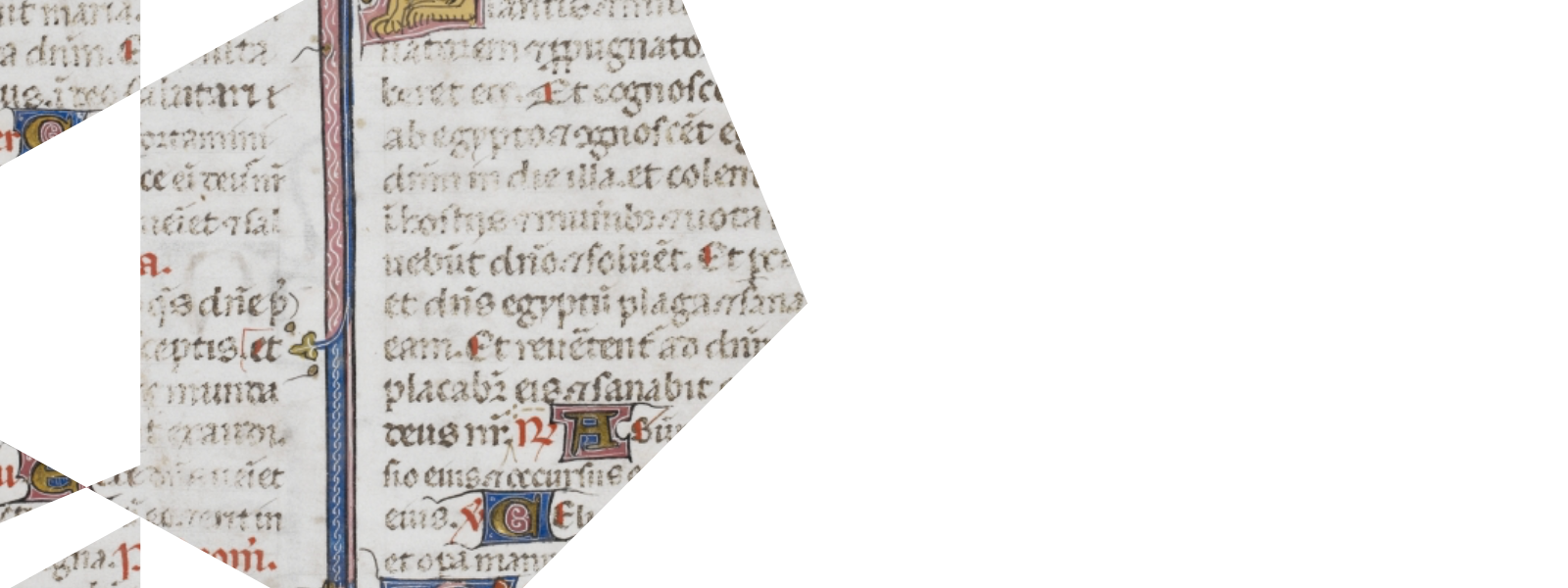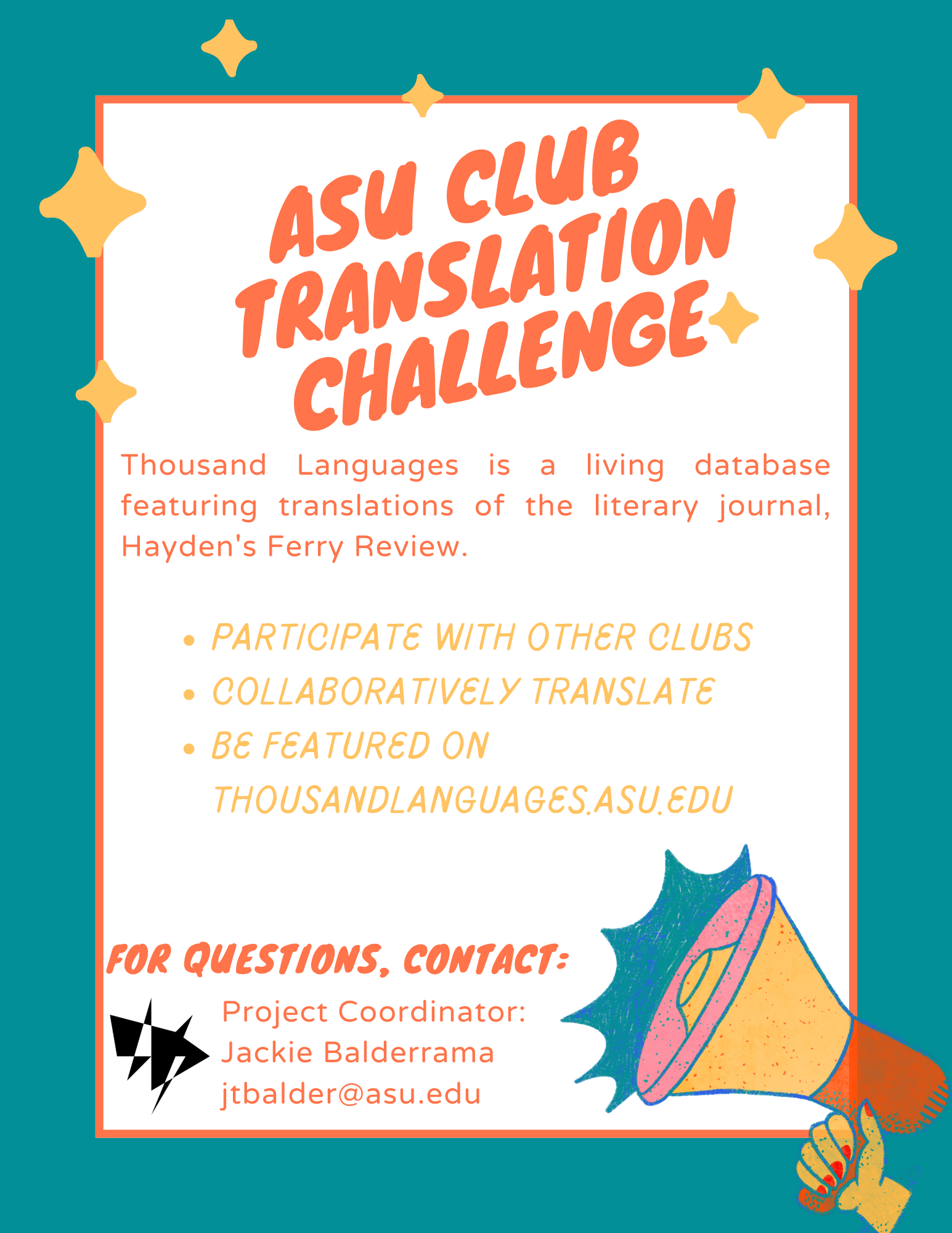
ASU Club Translation Challenge
The first installment of Simultaneous Translations highlights the language diversity in ASU's student communities.
Thousand Languages is partnering with student-run organizations and individual students from all ASU campuses and will feature their simultaneous translations on the database. Participants will translate the feature poem into a chosen language. Translations may be submitted collaboratively or individually. This is a fantastic opportunity to contribute your voices to an exciting new project.
This fall we received submissions from Club Italiano, Fluent Fridays, and individual student submissions.
Join the challenge
Eligibility: All ASU Students are invited to submit. Although part of our goal is to highlight student organizations, we want to be inclusive of ASU's diverse voices.
ASU students may participate individually or collaboratively as part of a student-run organization or shared class.
Languages: The challenge requires participants to translate from English into their chosen language. This includes interlingual translation as well as translation across text-type (i.e. written to signed languages, written English into visual art or dance, etc.)
Review: Please proofread. We encourage participants to reach out to their faculty advisor or other appropriate scholar knowledgeable in the chosen language(s) to review translations prior to submission.
Submit Translations
Please have ready:
Names of all participants
Complete Translation as a doc(x) or google doc
If submitting as a club: Club Information & Club Advisor Contact
Note: Submitter must log in with their ASU email.
For questions, contact: [email protected]
We are no longer accepting submissions

Featured poem / translation challenge
"Ama" by Samyak Shertok
Kiss the hand that slaps you. Hunger is sweeter than wild
honey. You were born in the Year of the Bull, but you’re a
snow-maned horse. Every year the street dog becomes a god
for one day. When the sky is red with locusts, even the
hoppers hurl themselves into the wind. You can offer only
your lips, not your shoulders, to the bull on the edge of a
cliff. Never come home empty handed: a mustard seed,
prayer beads, a thorn... In blossom I sang koel: I sang vulture
in wildfire: to keep your eyes from becoming moon petals, I
sang stone mill and nettle. In the dark, your own dog will bite
of your calf. If you sow a pear, you won’t reap a persimmon.
When you can’t tell star from star, bolt the house and remain
silent until the crow caws. No bull wanders of to the
precipice by accident. Sleep with the thorn under your pillow:
one night you’ll need it to pluck a stinger from your horse’s
iris. Milk, drunk too much, becomes hemlock. Some hungers
have no name. Kiss the eyes of a woman who watched her
child grow cold on her lap and you’ll know what it means to
carry a falling bull in your throat. Ama’s words: fart inside a
lake. A crow perched silent on the persimmon branch is
never just a crow. Every ancestor is a bull walking out of the
wildfire. I’m speaking through a mouthful of bees.
About this poem:
"Ama," which means mother in my mother tongue, Tamang, is a catalogue of advice, anecdotes, proverbs, and songs my mother has shared with me over the years. It started with me writing down the Tamang phrases that I found idiosyncratic in diction, cadence, syntax, semantics, or humor. But soon Ama's mouth grew into a collective voice for all my ancestors, both real and conjured. The poem is haunted by not only the ghosts but also language since its "original" version is already a translation in English, which perhaps makes itself a ghost. "Ama" is an ode to my mother tongue and my mother, and a documenting of knowledge and words passed down from my ancestors to me to the daughter I may never have.

Samyak Shertok’s poems appear in Best New Poets, Blackbird, The Cincinnati Review, Gettysburg Review, New England Review, Shenandoah, Waxwing, and elsewhere. A recipient of the Robert and Adele Schiff Award for Poetry, the AWP Intro Journals Award, and the Gulf Coast Prize in Poetry and a finalist for the National Poetry Series and the Jake Adam York Prize, he has received fellowships from Aspen Words, the Vermont Studio Center, and the Fine Arts Work Center in Provincetown. Originally from Nepal, he holds a PhD in Literature and Creative Writing from the University of Utah and is currently a Hughes Fellow in Creative Writing at Southern Methodist University.
About Simultaneous Translation
Can there ever be a definitive translation of any text? A translation so complete that others are unnecessary? Or are there infinite versions of that text that could exist, adding shades of meaning, personality, or nuance to the source text?
We believe in the value of a multiplicity of voices and interpretations, each of which adds complexity to our understanding of a source text. Therefore, every sincerely embarked upon translation has its own authority, stemming from both the original language text and its translator. To highlight the simultaneous nature of translation, which allows these many versions to exist concurrently, we’re asking for bilingual people and translators of all levels, from around the world, to respond to a single text simultaneously. Our next simultaneous translation will be scheduled soon.